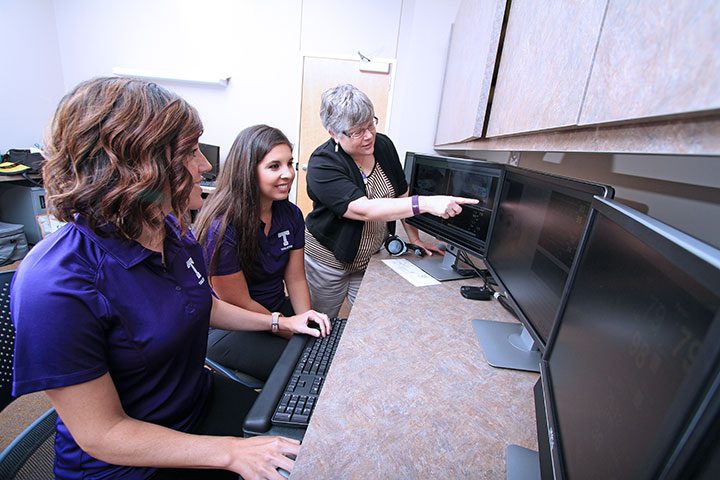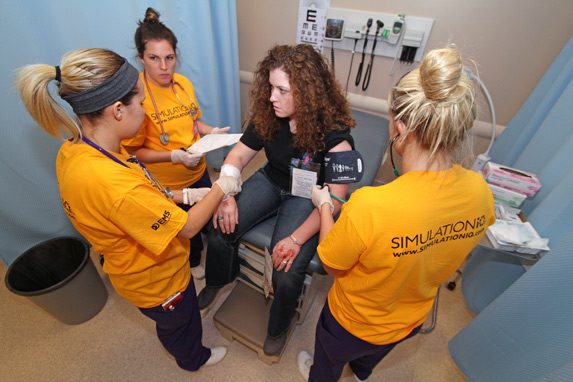Master of Science in Nursing
Develop leadership and teaching skills using the latest tools, technology and assessment instruments in nursing education for a specialized career as a nurse educator. Tarleton’s Master of Science in Nursing degree with a major in Nursing Education is designed for registered nurses who already have a BSN to provide them with the knowledge, experience and confidence they need to teach future nurses. The accredited MSN program has flexible options such as online courses and part-time enrollment to earn your master’s in nursing education in as quickly as one year.
With a focus on patient-centered care and outcomes, we promote health, shape health care delivery, defend social justice and advance the profession of nursing. Join us in this effort while advancing your career in nursing.
If you’re a registered nurse who needs a BSN, you may be interested in Tarleton’s undergraduate nursing degree program instead.
What is Nursing Education?
In a complex and ever-changing health care delivery system, nurse educators need to stay informed with current and emerging health practices and technologies. Tarleton strives to improve the educational credentials of the region’s nursing workforce with an accredited graduate nurse degree that fulfills nurse educator job requirements. Our master’s in nursing education explores concepts, theories, principles, roles and skills that prepare registered nurses to teach patients, families, health care consumers, nurses and nursing students.
What Can You Do With Your Master’s Degree in Nursing Education?
Our accredited Master of Science in Nursing with a major in Nursing Education prepares you for leadership roles as nursing educators, consultants or practitioners. You could teach college students as a faculty member in a nursing education degree program, instruct registered nurses as a nurse educator at a health care clinic or hospital, or develop and implement policy and curriculum plans for governments or schools.
Our graduates work in the nursing education field in a variety of jobs such as these:
- Director of Nursing
- Chief Nursing Officer
- Clinical Research Director
- Department Head
- Director of Simulation
- Education Resource Specialist
- Nursing Home Administrator
- Nursing Instructor
- Manager of Education and Clinical Support

Estimated Completion
36 – 39 credit hours
Application Process
- Admission to Tarleton State University – Graduate Studies
- Students should note that they must have their bachelor’s degree in nursing in order to be admitted to either master’s program as well as have their RN license.
- We accept applicants year-round. Courses start every 8 weeks.
Cost
Locations Available
- Online (two onsite practicum requirements)
Department of Post Licensure
College
How Much Do Nursing Education Graduates Make?
The average annual salary for nurse educators in academia is $75,000. Nurse educators who work in the hospital setting potentially earn more.
Learn more about graduate studies at Tarleton!
Why Study Nursing Education?
We offer outstanding, student-focused instruction through the convenience and flexibility of online learning.

Become part of a tight-knit community and profession
Our online coursework provides a variety of ways to engage and collaborate with your peers and professors. Highly experienced registered nurses, all of our faculty members have master’s degrees and many also hold PhDs. We know first-hand what it takes to succeed in today’s health care industry, and we share our experience, skills and passion with graduate nursing students. Our areas of specialty include education needs of nurses, job embeddedness, reduction of student anxiety and stressors, student transformative learning and pesticide exposure.
What Classes Will You Take as a Nursing Education Graduate Student?
All MSN nursing program courses are online except the two practicum experiences. The accredited nurse educator degree program requirements start with core courses in theory, informatics and research. Then you’ll explore topics in curriculum development, instructional methods and strategies for adult learners, pharmacology and pathophysiology.
Choose the thesis or non-thesis track, depending on whether or not you want to conduct original research and prepare for doctoral degree programs to become a nursing scientist. In the thesis track, you’ll work closely with a faculty adviser to plan, conduct, analyze and report on a research topic related to nursing education.
View all required classes for the nursing education master’s degree.
Accreditations
- Southern Association of Colleges and Schools Commission on Colleges (SACSCOC)
- Commission on Collegiate Nursing Education





